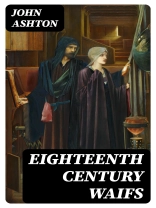In ‘Eighteenth Century Waifs, ‘ John Ashton delves into the fraught societal landscapes of the 1700s, portraying the precarious lives of those marginally existing within the cultural framework of the time. Ashton’s literary style, characterized by a blend of vivid narrative and acute historical analysis, evokes a rich tapestry of characters and their often tragic circumstances. Drawing on extensive primary sources, he explores themes of abandonment, identity, and resilience, set against the backdrop of rapid societal change and economic turmoil that marked the age of Enlightenment and the early Industrial Revolution. John Ashton was a prominent folklorist and scholar of the Victorian era, whose fascination with the cultural undercurrents of history significantly influenced his writing. His extensive research on the lives of the less fortunate in society reflects a keen awareness of the socio-political dynamics that shaped human experiences, compelling him to shed light on the ‘waifs’ of the eighteenth century. Ashton’s ability to weave narrative with scholarly rigor offers readers an introspective look into a time often romanticized yet filled with strife. This meticulously crafted work is recommended for readers interested in the interplay between history and literature, offering a piercing insight into the overlooked narratives of the past. Ashton’s ‘Eighteenth Century Waifs’ not only serves as a historical account but also invites contemporary reflections on identity and the human condition, making it a must-read for scholars and casual readers alike.
Sobre el autor
John Ashton, an author with a particular interest in the anecdotes and social mores of the 18th century, has made an enduring mark in the field of history and sociology with his notable work, ‘Eighteenth Century Waifs’. His scholarly pursuits delve into the everyday lives and conditions of lesser-known individuals during this period, offering readers a rare glimpse into the past beyond the façade of grand historical narratives. Ashton’s investigative prose uncovers the nuanced and often overlooked facets of 18th-century society, illuminating the influences and consequences of living in an era marked by significant social and political change. His work is characterized by meticulous research and a narrative style that brings the century’s ‘waifs’, or marginalized figures, to the forefront, thereby contributing a unique and valuable perspective to historical literature. Scholars and enthusiasts of the period frequently reference ‘Eighteenth Century Waifs’ for its rich detail and empathetic portrayal of the complexities of life in bygone eras, affirming Ashton’s role as a respected voice in the documentation of 18th-century culture.












